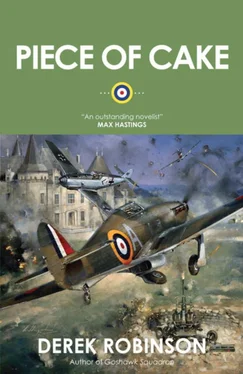Two hours later the pilots of Hornet squadron were still lying on the grass, a short sprint from their Hurricanes. Standby time had come down to ten minutes, then to five. Now it was two. They had watched one of the Spitfire squadrons take off and disappear, heading east. A few minutes later the other Spitfire squadron had followed them. The rumble of their engines could still be heard, faintly.
Skull appeared on a bicycle, pedaling hard. “I’ve been in the ops room,” he said to Barton. “It’s the most extraordinary thing. In the last fifteen minutes every squadron in the Group has been scrambled. That’s twenty squadrons airborne.”
“And how many raids?”
“One.”
“What? Hey, that’s marvelous! Twenty squadrons, at least two hundred kites, all on one raid… We’ve got the buggers where we want them.” Barton grinned at his pilots, and they grinned back. “For months I’ve been waiting for the day when woutnumbered them , and here it is!” He whooped with glee and threw his hat at the sky.
“How big is the raid?” CH3 asked.
“Oh, it’s big. It’s—”
“Come on, come on, come on!” Barton kicked the pole that had the telephone attached to it. “What are they waiting for? Everybody else is up. Why not us?”
“You say everyone else is scrambled?” CH3 said. “We’re the only reserve? That’s damn dangerous, isn’t it?”
The telephone rang, and Barton grabbed it. It was the scramble order, and they pounded to their planes.
The controller’s instructions were unusually brief.
“Hello Bearskin Leader, this is Trombone,” he said. All the codenames had been changed. “Steer zero-four-five and patrol Lampstand at angels six.”
“Happy to oblige, Trombone,” Barton said, and ran his finger down the codelist of the day. Lampstand was the Isle of Sheppey. Angels six meant angels ten.
He held the squadron in a power climb. After a minute, Trombone raised the angels to eight, which meant twelve.
Barton felt restless; he was always twisting to look and make sure nobody was lagging behind, and then leaning forward to search for the scrap. There must surely be a major scrap ahead, what with twenty squadrons scrambled already. He couldn’t imagine what twenty squadrons would look like, all concentrated on one raid.
The voice of his wingman cut in. “What’s wrong, Leader?” CH3 said. “Dropped sixpence?” Barton stopped twisting. “Found it,” he said. “Threepenny bit.”
CH3 felt content. Flash Gordon’s death had cleansed his emotions: all pettiness had been swept away in that rush of shared grief. By their manic horseplay with revolvers they had briefly held a wake for Flash. Life had saluted death in a suitably random fashion, and now life went on.
Trombone raised the angels again. Now the target height was sixteen thousand. Hornet squadron went onto oxygen. No word about the raid. Barton assumed it was holding its course.
A dun-colored skim of industrial haze covered the Thames estuary. To the right, Kent was a huge green-and-gold thumb stuck into the Channel, and the Channel itself sparkled as if touched with static electricity. Barton found Ramsgate, out at the end of the thumb, and saw where Manston must be. A year ago he had flown to Manston to apologize to the skipper of a Blenheim squadron. He remembered it quite calmly and evenly. That was the young Fanny Barton, that was. No relation to the old Fanny Barton now leading his squadron to a lovely great scrap, if only they could find the bloody thing.
“Hello, Leader,” CH3 called. “You sure we’re in the place of honor?”
“I think we missed a turning somewhere,” Barton said.
“Bloody Spits,” Cox said. “They’ve gone and scoffed the lot.”
“Bogey at ten o’clock,” Patterson warned.
Far away to the left, a faint bundle of dots could be made out, heading east. Eventually it grew and matured into a hard, tight clump.
“Hurricanes,” Cattermole said. “In their Sunday best.”
The other squadron was using the orthodox, peacetime formation: four vies of three, neatly locked into an arrowhead. The sight made Barton uneasy, and he checked his own aircraft. “Ease out a bit, everyone,” he said.
Patterson, at Blue Two, began to wonder if the Spits really had scoffed the lot. Maybe Hornet squadron had been sent to clean up the leftovers. Maybe there were no leftovers. Patterson welcomed that idea. All the way from Brambledown his stomach muscles had been jumping with fear and tension. Everything about him felt uncomfortable: his mouth ached where his teeth had been knocked out, his legs and feet were ice-cold, his torso was wet with sweat, he needed desperately to pee, his straps were all wrong and the buckle stuck into his ribs. He wanted to get this patrol over as soon as possible.
Alongside Cattermole, Steele-Stebbing was happy about everything except his eyes. He had been up and down so often in the past few weeks that his sinuses had become very sensitive to changes of pressure. Now they felt as if they had been blown up with a bicycle pump, and every other breath sent sparks drifting across his eyeballs. He trained himself to look between and beyond the sparks.
The north Kent coast was not far away when they met a layer of haze.
The other Hurricane squadron was now a mile or so ahead. Beyond his left wingtip Barton could just make out the Isle of Sheppey. The haze thinned and dissolved and fled away and he saw, crossing his front from right to left about a mile ahead, the first wave of a flood of aircraft. Automatically he counted the bombers in the front rank, doubled it for the second, doubled that for the third and fourth. Forty bombers, close-packed. After them the flood grew stronger, layer stacked on layer, rearing ever upward until the mass was more than a mile high, and that was only the beginning. The flood went on. It was an orderly torrent of aircraft that stretched to the horizon.
Hornet squadron was at sixteen thousand feet, and the pilots could look far down on the lowest layers and then far up at the highest. The enemy darkened the sky. In this colossal wedge there were something like a thousand German bombers and fighters, all making for London.
Barton searched, and found odd flights and sections of Hurricanes and Spitfires darting at the mass. Then he looked ahead and saw the other Hurricane squadron—still as compact as a troop of Household Cavalry—go wheeling into the first stages of a Fighting Area Attack. “Silly sods’ll get jumped,” Cox said. Barton checked the sky above. Dropping fast were four Me-109’s. He called a warning. No response: the other squadron must be on a different frequency. He ignored it and concentrated on the bomber stream, now coming up fast.
“Okay, Bearskin aircraft,” he said. “In and out fast. Let’s chivy the buggers.” As his sections split up to make their separate attacks he glimpsed the four 109’s rolling away from two burning Hurricanes at the tail of the formation.
Hornet squadron accomplished quite a bit of chivying before the escort got amongst them. The raiders were so thick that it was like shooting at a parade. This parade shot back, with ten times the firepower. The sky was a moving embroidery of tracer and incendiary and cannonshells.
Cattermole made the first kill.
Steele-Stebbing was Yellow Two and he guarded Cattermole’s tail faithfully. Although his stomach was much harder nowadays, his heart pumped like a sprinter’s as Cattermole made him do the utmost violence to the Hurricane’s controls. But it paid off. A wandering 109 flew straight and level for one second too long and Cattermole put a burst into its cockpit. The 109 reared. Cattermole plunged under it and Steele-Stebbing followed, dust and fluff swirling up from the cockpit floor. Cattermole jigged to go left, changed his mind and went screaming off to the right. Steele-Stebbing tipped his machine onto its wingtip and the g-forces briefly drained strength from his arms and legs. Cattermole’s plane came in view again, chasing a wildly-rocking Dornier. As Steele-Stebbing leveled out a spot of oil flew up and splattered itself on his goggles. He dragged the back of his glove across the goggles and saw a 109 nipping in behind Cattermole. Everyone fired at once: Cattermole hit the Dornier, the 109 hit Cattermole, and Steele-Stebbing missed the 109 but he gave it the fright of its life and it sheered away. Then he heard a faint thump-thump-thump that wasn’t the pulse in his ears and the instrument panel turned into shattered glass and splintered wood and a small tornado was blasting into the cockpit and his left arm was chopped off at the elbow and blood was squirting all over the canopy.
Читать дальше












